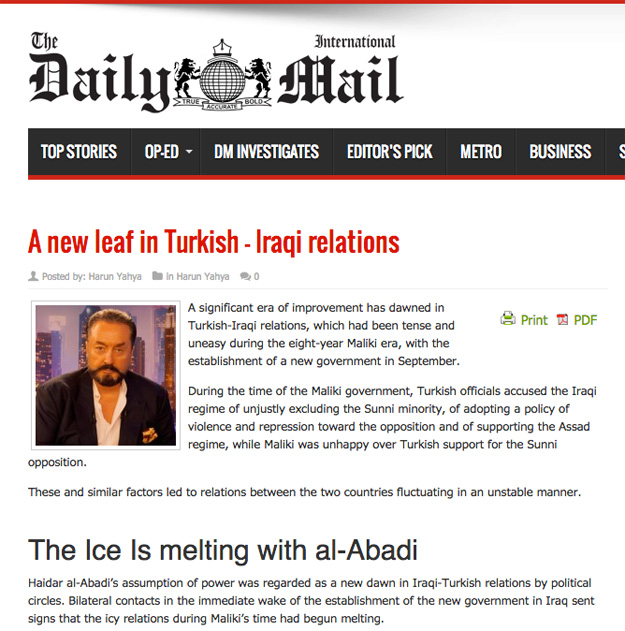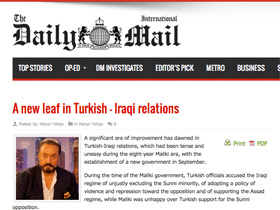
A significant era of improvement has dawned in Turkish-Iraqi relations, which had been tense and uneasy during the eight-year Maliki era, with the establishment of a new government in September.
During the time of the Maliki government, Turkish officials accused the Iraqi regime of unjustly excluding the Sunni minority, of adopting a policy of violence and repression toward the opposition and of supporting the Assad regime, while Maliki was unhappy over Turkish support for the Sunni opposition.
These and similar factors led to relations between the two countries fluctuating in an unstable manner.
The Ice Is melting with al-Abadi
Haidar al-Abadi’s assumption of power was regarded as a new dawn in Iraqi-Turkish relations by political circles. Bilateral contacts in the immediate wake of the establishment of the new government in Iraq sent signs that the icy relations during Maliki’s time had begun melting.
The visit to Turkey in November by Iraqi Foreign Minister Ibrahim al-Jaafari was perceived as a sign of the Iraqi government’s wish to restore relations between the two countries.
A reciprocal visit to Iraq by the Turkish Prime Minister, who held meetings with both Prime Minister al-Abadi and Masoud Barzani, head of the Iraqi Regional Kurdish Administration, was intended as a positive response to the Iraqi government’s gestures of good will.
Finally, al-Abadi’s recent visit to Ankara heralded the end of the period of crisis of Maliki’s time and the turning of a new page between Iraq and Turkey.
Mutual Interests and Needs
There is no doubt that both countries stand to benefit from improved and stronger relations. Iraq, whose exports consist almost entirely of oil, is looking for a way out of the latest oil crisis, which has had a major impact on it. Trade with Turkey is very important at this point. In short, it needs Turkey.
The same goes for Turkey. Iraq is Turkey’s second largest partner in terms of volume of trade, after Germany. Exports of $1.8 billion rose from 2004 to exports to Iraq worth $12 billion in 2013.
However, in the wake of Maliki’s oil minister’s instruction in June 2014 that “There will be no dealings with Turkish companies” a significant fall in numbers was recorded. External trade with Iraq fell to $646 million in August, while losses on the Iraqi front since June reached $500 million per month. Iraq fell to third place in terms of volume of trade, replaced by Great Britain. In conclusion, trade with Iraq occupies an important place in the Turkish economy.
The same thing applies to Iraq: Good relations with Turkey will provide Iraq, possessor of some of the world’s richest energy resources, with a significant advantage in opening up to global oil and natural gas markets. Indeed, Prime Minister al-Abadi has personally expressed his wish to see Iraqi oil exported to the world through Turkey.
After energy, one of the areas in which Iraq is most dependent on is the sharing of the waters of the Tigris and Euphrates; the two countries signed a collaboration agreement last month.
Iraq Is an Important Area of Investment for Turkey
On his visit to Turkey, Prime Minister al Abadi stated that there were 14 more provinces in Iraq not under threat from ISIS and called on businessmen to invest in them. Since the people of Iraq feel great proximity to Turkish culture in many respects, such as food and clothing, imports in these sectors are to a large extent reliant on Turkey. Barzani also said in a statement that, “If imports from Turkey were cut off, we have three days’ stocks left.”
In the same way, the Iraqi people want to see Turkish firms investing in the country rather than other foreign companies. The Iraqi government is planning some $200 billion dollar of investment over the next five years, but has only set aside an infrastructure budget of $30 million for 2015. Turkish companies taking part in those investments will represent a significant source of revenue for Turkey, particularly those in the construction sector.
The Gali-Zakho tunnel, consisting of two separate tunnels 3,600 meters long that will facilitate movement between Turkey and Iraq, is planned for completion in 2015. Transport will become easier, safer and faster and this will significantly increase mutual trade.
So far, the main areas of mutual benefits that will stem from collaboration in spheres such as natural resources, energy, trade and investment have been analyzed. However, it must not be forgotten that all these benefits and advantages are not an end in themselves for the two countries, but only a means to peace, happiness, security, well-being, friendship and unity between the two fraternal communities. These two powerful counties entering into friendship and collaboration, irrespective of sectarian differences, will represent an important model for the region and create the potential for new partnerships.
Adnan Oktar's piece on Daily Mail:
http://dailymailnews.com/2015/01/18/a-new-leaf-in-turkish-iraqi-relations/


